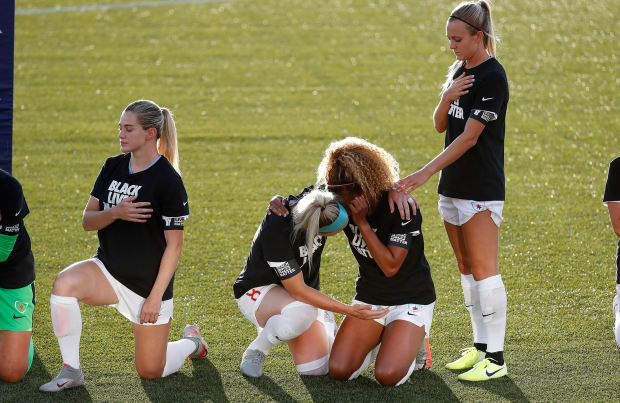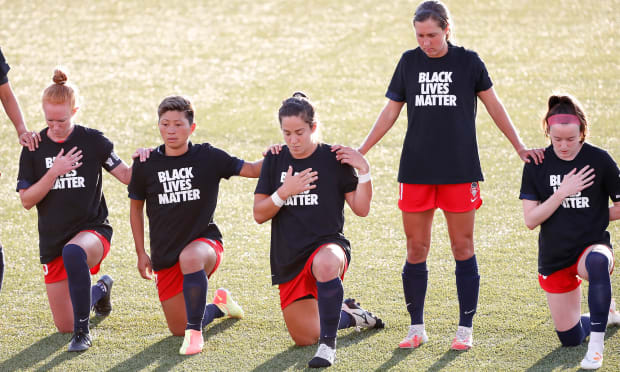New on Sports Illustrated: NWSL Approaches the Anthem With Best Intentions but Is Misreading the Moment
The league has good intentions, but its initial handling of the pregame national anthem and subsequent shift have resulted in some negative and avoidable consequences.
The predictable snowball effect is here.
NWSL returned on Saturday, kicking off its Challenge Cup tournament/likely 2020 season substitute in Utah. In the opener, Lynn Williams's stoppage-time header lifted the defending champion North Carolina Courage to a 2–1 win over the Portland Thorns. In the nightcap, Rose Lavelle helped spark the Washington Spirit to a 2–1 win over the Chicago Red Stars. Despite
all the missing USWNT players from this competition, two entertaining matches unfolded, and more are on the horizon. It's great to have the sport back in the U.S.You'd be forgiven for not fully grasping all of that, though. The discourse surrounding the league and that night, still some three days later, has been focused solely on the national anthem.
This had to have been expected to some degree once the league elected to play the anthem at its tournament. Unlike MLS, which is not electing to play the anthem at its return-to-play tournament that will have no spectators, NWSL, which also has no spectators, forged ahead. The Courage and Thorns conducted a choreographed peaceful protest, with all starters and nearly all players kneeling. Teams and the NWSL players association put out statements. After Colin Kaepernick, and to a lesser extent Megan Rapinoe after that, were chastised and ostracized for their actions a few years ago, it was a powerful group display.
It's morphed into so much more, though, with the message being twisted. The Spirit–Red Stars nightcap will forever be known for the image of Julie Ertz consoling Casey Short, the latter overcome by emotion. Teammates have been pitted against one another if there isn't a unanimous viewpoint in the locker room. International players with little to no connection to the U.S. outside of their employer are suddenly thrust into a high-pressure situation. Players who are uncomfortable sharing their feelings—on any side of this topic—are forced to make a choice that indicates one thing about them, even if that perception may not be entirely true.

Asinine, oblivious takes, such as Alexi Lalas's since-deleted-and-apologized-for "Now it takes courage to actually stand for the national anthem" tweet fanned the flames even more. This multi-day saga has completely changed the focus of what the anthem protests were supposed to be about. It's ostensibly no longer about calling attention to the racist police brutality that resulted in the killing of George Floyd in Minneapolis and so many more Black people before him.
It's about who is and isn't standing and what it says about them in various echo chambers. It's about whose political beliefs are what. It's brought a circus-like distraction to something that is meant to be centered on something profound. It's nobody's job to tell others how they can and cannot peacefully protest, but when seeing the effects of how this has all played out, it would be fair of the league to reconsider whether the right message is getting across and whether this kind of attention is all really worthwhile.
The easy choice would've been to stop playing the anthem altogether. The easy choice isn't always the right one, but here it could have been both. Release a statement indicating that the intention was to honor America and allow players the opportunity to freely display their feelings, but it's wound up having a divisive impact and straying so far from the original sentiment. For the players who want to draw attention to an important cause, kneeling at the opening whistle and wearing warmup T-shirts with "Black Lives Matter" written across them, for example, can and do still serve that purpose.
Instead, NWSL made a curious choice: The anthem will still be played at the empty stadiums, but players now have an extra option. They can stay in the locker room until it's over, or come out onto the field and either stand or kneel. Staying in the locker room, of course, was the protest of choice for select Seattle Reign and FC Kansas City players in 2017. Having the anthem played with players in the locker room before they could take the field was also the choice of the Spirit when Rapinoe's Reign happened to be in town. It's a gesture that brings with it some likely unintentional callbacks while also creating another "group" for players to fall into.

"This decision was made following conversations with players from around the league, as well as club officials and other stakeholders," NWSL said.
Without knowing specifics, it's unclear how many of each party had a say, what the demographic makeup of those polled was and whose opinions were weighted the most. For new commissioner Lisa Baird, who should otherwise be commended for attracting new sponsors during a pandemic and having this tournament organized after three atypical months on the job, she has had to lean into this as her chief objective.
“We began this tournament with several important goals," Baird said in a statement on Monday. Develop a safe environment for the continuation of sport. Create an innovative competition to showcase the vitality of women’s soccer. Collaborate with our players association and develop a genuine partnership. Raise revenue to fund player compensation. And support and empower players to use their platform to make the world a better place. And so, we’re going to continue to play the national anthem, but with even more flexibility, and support each player’s right to express their individual views, or not. The NWSL stands behind every player, official and staff member. Kneel on the field. Stand with your hand over your heart. Honor your feelings in the privacy of the locker room or at midfield. The NWSL is a league that was built on diversity and courage and those principles will continue to drive us forward.”
There's absolutely nothing wrong with the intentions, but even actions carried out with the best intentions have unintended consequences.
New England Revolution and former U.S. men's national team coach Bruce Arena recently suggested not playing the anthem at club and league games (international competition is a different story), and he's not the only one to have the idea. Think about it: "God Save the Queen" doesn't play before Premier League games. "La Marseillaise" isn't blared before Ligue 1 matches. It's a uniquely American custom and tradition. It's prop-bet fodder for the Super Bowl. But everything about the anthem being played before games now is so far removed from its intention. It feels like it has so little to do with honoring America and those who defend its freedom. The cause that the peaceful protests are meant to bring attention to has instead been drowned out by chatter about the actions.
Make no mistake, NWSL has otherwise done a fantastic job of being a supportive league and giving its players a platform that they can truly use for causes important to them. But by misreading the moment and adjusting on the fly this way, it's taken the focus off the two things that should truly matter in this competition: an incredibly important message and the actual soccer itself.

Comments
Post a Comment